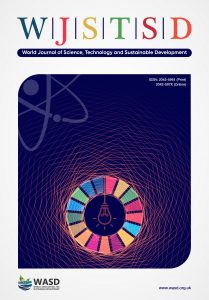Agricultural practices in a drought-prone region of India: opportunities for S&T innovations, Prof. Venkatesh Dutta, Dr. Manoj Vimal, Sonvir Singh and Prof. Rana Singh
Prof. Venkatesh Dutta , Dr. Manoj Vimal, Sonvir Singh, Prof. Rana Pratap Singh
, Dr. Manoj Vimal, Sonvir Singh, Prof. Rana Pratap Singh
DST Centre for Policy Research
Babasaheb Bhimrao Ambedkar University, Lucknow
India
Email: dvenks@gmail.com
DOI: 10.1108/WJSTSD-04-2018-0019
Purpose: The purpose of this paper is to assess the agricultural practices in a drought-prone region of India in an effort to find out how science, technology and innovation (STI) measures can address the existing problems and help achieve sustainable solutions. This study has been planned with two specific objectives: to study the agricultural practices of small and marginal-holding farmers in a drought-prone region and to examine the opportunities for suitable interventions to mitigate the impacts of droughts. The study is based on primary survey conducted in Banda district of Bundelkhand region, Uttar Pradesh, India.
Design/methodology/approach: Empirical survey was done in eight different blocks of a drought-prone region of India using structured questionnaire. The questionnaire was pre-tested with a group of 12 farmers during a workshop through a pilot survey conducted during April 2017. Stratified sampling based on land holdings (small farmers having 1–2 ha of land, medium farmers having 2.1–5 ha of land and large farmers having more than 5 ha of land) and irrigation types (canals and tube wells) were utilised in different blocks of the district for selecting farmers in the surveyed villages.
Findings: Findings suggest that due to various reasons like change in climatic conditions, frequent crop failure, crop diseases and high cost of production, farmers have adopted certain crops which are not suited to their agro-climatic conditions. The paper recommends that farmer’s school or “on-farm training school” have to be initiated to integrate farmers’ traditional knowledge with modern knowledge systems with amalgamation of STI tools.
Research limitations/implications: Uttar Pradesh is divided into nine agro-climatic zones; however, this study is focused on Bundelkhand and may be region specific, though the findings are important for other drought-prone areas.
Practical implications: The paper links the existing agricultural practices and further linking them with farmers’ socio-economic, cultural and environmental settings. Only 17.5 per cent of respondents owned any agricultural equipment due to high cost of farm tools, difficulty in taking equipements on rental basis and lack of sharing tools among the farmers.
Social implications: This paper targets small and marginal farmers in the drought-prone region of India who face the dual shock of climate impacts and poverty. Adoption of modern agricultural practices and use of technology is inadequate which is further hampered by ignorance of such practices, high costs and impracticality in the case of small land holdings.
Originality/value: This paper has advocated for well-organised, efficient and result-oriented STI system to mitigate the adverse impacts of drought-prone agriculture. Farming community in drough-prone areas needs adequate investment, local-specific technology, better quality inputs, real-time information on weather and most importantly latest know-how for sustaining commercial and cost effective sustainable agriculture.
Keywords: Policy; Technology; STI; Agricultural management; Precision irrigation.
Citation: Dutta, V., Vimal, M., Singh, S. and Singh, R.P. (2019), "Agricultural practices in a drought-prone region of India: opportunities for S&T innovations", World Journal of Science, Technology and Sustainable Development, Vol. 16 No. 4, pp. 208-226. https://doi.org/10.1108/WJSTSD-04-2018-0019

